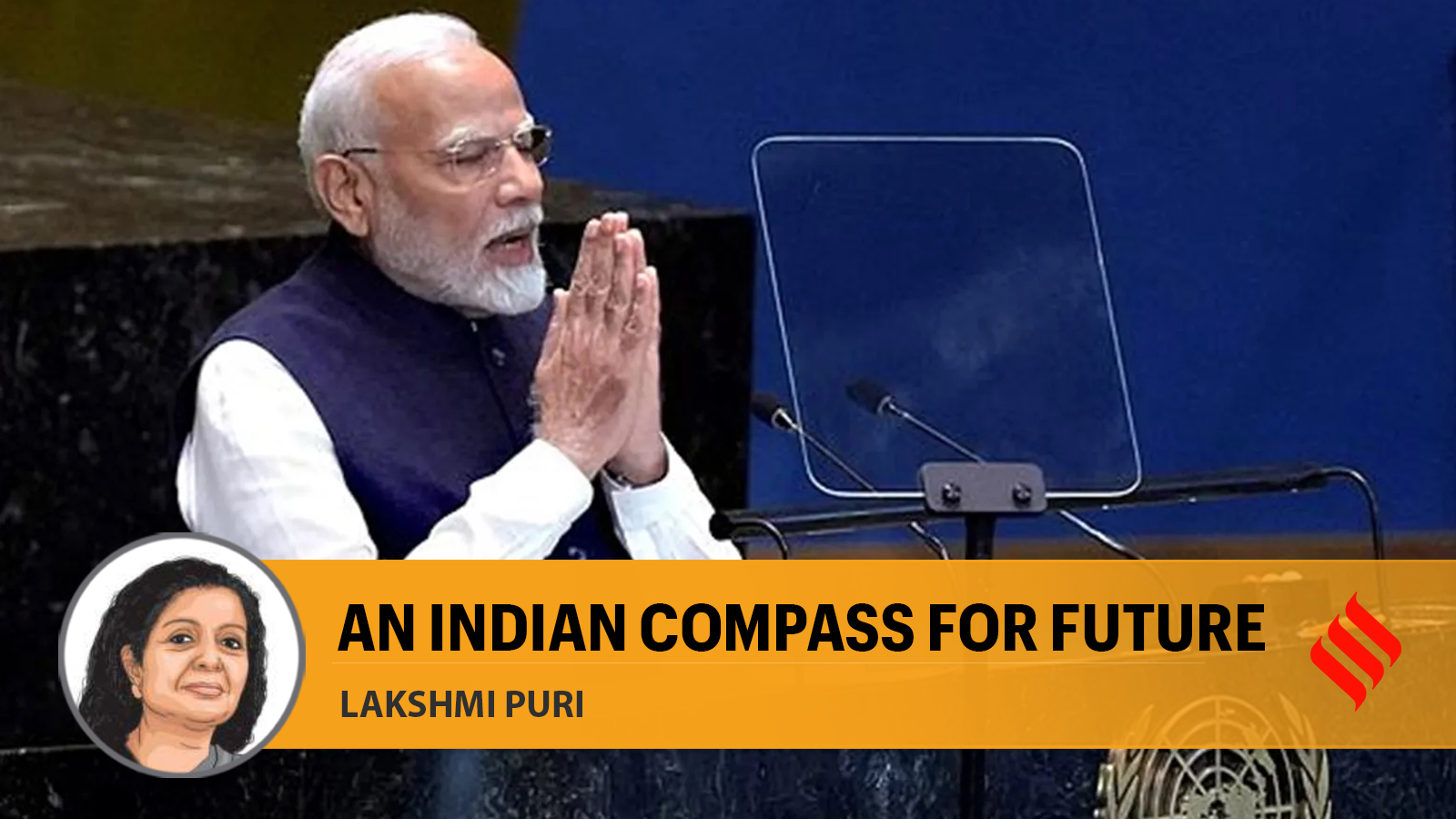India has an unbroken, civilisational heritage of Vasudhaiva Kutumbakam. This ethos was imprinted on to our G20 presidency by Prime Minister Narendra Modi. The country has the largest youth population in the world, it is the largest and most vibrant democracy, and is technologically future-facing. Intergenerational solidarity is also intrinsic to Indians. India thus has the greatest stake in any collective, global envisioning of a perfect future for humanity. This is what the Pact for the Future (PFF), the Declaration on Future Generations (DFG) and the Global Digital Compact (GDC) adopted at the UN Summit of the Future on September 23 attempts.
PM Modi joined 142 counterparts at the Summit and positioned India as a vishvamitra representing a sixth of humanity. He emphasised India’s vision of human-centric development and successes in SDGs, DPI and solar energy, which he offered to share. He brought the message of the G20 New Delhi Declaration (NDLD) and amplified the voice of the Global South. He urged eschewing war and addressing threats from new arenas — terrorism, cyber, maritime and space. Warning that reform is the key to relevance, he pointed to the admission of the African Union to the G20 . “Global action must match global ambition” he urged .
The UN Secretary-General admitted the “UN can’t build a future for our grandchildren with the institutions of our grandparents” and that the “multilateral system is gridlocked in dysfunction”. This crisis contributes to and reflects the emerging world disorder. Global flashpoints such as the NATO–Ukraine/Russia conflict, the West vs China cold war and the war in Gaza are of such intensity that leaders are invoking the unthinkable spectre of a nuclear armageddon and another World War. The UN is unable to prevent, mediate or resolve them, but is caught in the middle or made to pick up the humanitarian pieces.
The international community seems to have taken its eyes off the terrorism ball. A furious rearmament race is on. False narratives and foreign information manipulation and interference around democracy and human rights is being used perversely to bring about regime changes in developing countries. Meanwhile, the world is lagging in 88 per cent of the SDG targets. Extreme weather events are causing devastation due to climate change.
Much-needed financing from donors and unreformed and underfunded Multilateral Financial Institutions (MFIs), critical green technologies and debt relief have not materialised for developing countries. There is a serious solidarity deficit, undermining multilateralism by resorting to coercive unilateralism, transactional bilateralism, plurilateralism, minilateralism and regionalism .
Against this background, the Summit represented “a once-in-a-generation opportunity to help rebuild trust and bring outdated multilateral institutions and frameworks into line with today’s world, based on equity and solidarity.”
The PFF’s 58 actions partially did this by addressing issues in the global public good areas of conflict prevention, peacemaking, disarmament and counter-terrorism; SDGs, environmental protection and climate action and its financing; human rights and democracy including gender equality; disaster risk reduction and humanitarian response, and science, technology, digital revolution and transforming global governance.
The Summit demonstrated the convening, consensus building and norm power of the UN to get governments to come together. It reiterated key earlier principles and pledges, vowed to implement them and assumed some new responsibilities. Countries got to “prevision” the future perils and possibilities to better shape the present. However, sceptics point to the Summit being more about “why” and “what” but not how to operationalise and enforce these “soft law” commitments. For instance, the PFF vowed to “take bold, ambitious, accelerated, just and transformative actions” to achieve SDGs and climate action. What was missing was the call the NDLD made “to scale up SDG and climate finance for developing countries from billions to trillions” and pin down the amount needed.
India has reason to be satisfied with the commitment “to pursue a future free from terrorism” and “violent extremism conducive to terrorism” in every way and at all levels including through revitalising the Convention against Terrorism. It condemned terrorism “in all its forms and manifestations committed by whomever, wherever, whenever. All terrorist acts are criminal and unjustifiable regardless of motivation or how their perpetrators may seek to justify them.” UN mechanisms, however, are still hobbled by donor money and agendas.
An elaborate text pledged to make the UNSC “more representative, inclusive, transparent, efficient, effective, democratic and accountable,” and enunciated principles for expansion and reform including Africa being given priority and implicitly presaging the inclusion of developing countries like India. While the US was very positive, the other P5 and usual spoilers prevented any time-bound, text-based breakthrough. Only a larger grand bargain or a two-thirds majority vote in the UNGA may break the 35-year logjam.
The Global Digital Compact is a significant normative outcome and takes forward India’s G20 thrust on bridging the digital divide, fostering the digital economy and digital public infrastructure for achieving SDGs. It proposed the establishment of a multi-disciplinary Independent International Scientific Panel on AI and a Global Dialogue on AI Governance:
We now have a compass, however imperfect, for guiding us to our one future as one earth, one family. If countries work together, rising above “narrow domestic walls”, we will be able to right wrongs, survive future shocks and thrive as a people and planet. The UN can’t make miracles unless “we the people”, the UN Secretariat and the member states believe so and dare to act. As a Sanskrit saying goes,“Yad Bhavam, Tad Bhavati” — you become what you believe.
The writer is a former assistant secretary-general at the United Nations and the former deputy executive director of UN Women



